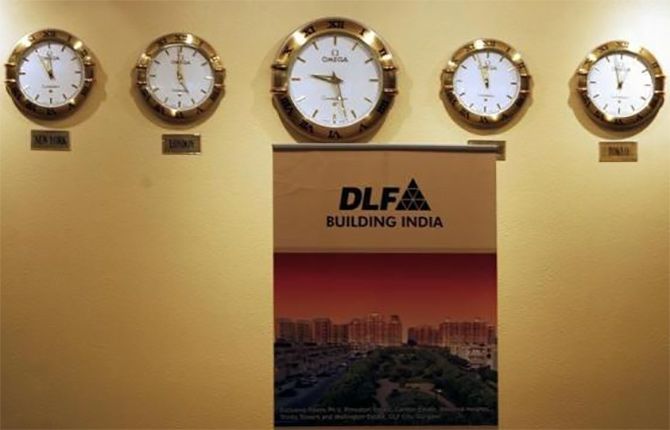Since the order that banned DLF and its chairman, K P Singh, from accessing the capital markets for three years, the company has struggled.
 DLF, the land and property development major, is due to release its second quarter (Q2) results this Thursday.
DLF, the land and property development major, is due to release its second quarter (Q2) results this Thursday.
It is likely to be a stormy occasion, with last month's action against the company by the Securities and Exchange Board of India (Sebi).
Since the order that banned DLF and its chairman, K P Singh, from accessing the capital markets for three years, the company has struggled.
It traded at about Rs 150 a share a little before the Sebi order. This dropped to a low of Rs 100 a couple of sessions after and has since recovered to about Rs 135.
Every real estate company is cash-strapped at present.
Prior to the order, DLF had said it would raise substantial funds from the market. It can no longer do so via either the equity or debt markets.
Nor can it set up REITs (real estate investment trusts), closing another avenue of potential funding.
These will put more stress on its balance sheet. The question mark about the management's probity is also a negative if it is looking for funding in the future.
However, the depressed price of the stock could still make it a bargain. If you believe the market estimates of DLF's net asset value, it might be in excess of the current price.
Of course, real estate valuation is notoriously difficult.
There has also been some easing of norms, allowing foreign direct investment to come into relatively small projects of 20,000 sq metres.
Perhaps this route to funding is still open for DLF and it could help in tiding over the current situation. Will the company be able to stay afloat for the three years of the ban?
If it is, it could be worth accumulating. It is also not unlikely that DLF will be ejected from the NSE's benchmark Nifty index — it has one of the lowest of free float capitalisation in the latter.
However, it could be retained, too, as it is still the largest real estate company by market capitalisation.
If it is pulled out of the major index, it would automatically be sold by exchange traded funds and by foreign institutional investors, which track the Nifty.
The Q2 results are unlikely to provide definitive information but will definitely influence market opinion about DLF's likelihood of survival. In turn, that could mean a sudden spurt of investment in the stock, if the consensus is that it will weather the current storm.
Alternatively, the results could trigger another wave of heavy selling. It is possible there will be a massive swing on and around the results, even if we have little idea of the likely direction.
It is also extremely likely to influence price trends of other realty stocks, though the latter don't face the same specific regulatory problems.
The problem for a trader is that the direction of the swing, if it occurs at all, is not known.
The three-year prospects of DLF and the valuations are relevant only in that these will influence the price trend over the next couple of weeks.
The technical perspective suggests shorting could be a lucrative action.
The pattern of Rs 150 down to Rs 100 and back up to Rs 135 is more indicative of a dead-cat bounce than a sustainable recovery.
If the stock starts falling on the Q2 results, it could break down into double-digit territory.
On the other hand, a pullback above 150 would suggest that someone with deep pockets believes in DLF.


.jpg)









 © 2025
© 2025